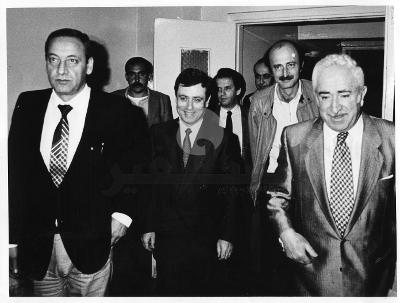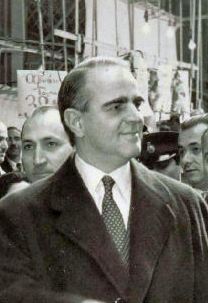Delegates to the Lebanese reconciliation conference began detailed talks today on a program of national political changes.
Participants at the Lausanne talks, which began Monday, said that now that everyone had had two days to express strong feelings and strike uncompromising poses for their constituencies back home, Syrian ”horse trading” had got under way. The Syrian Vice President, Abdel Halim Khaddam, is the ultimate arbiter of how much each side will give and receive, they said.
After a brief morning session attended by President Amin Gemayel, the eight Lebanese factional leaders and the Syrian and Saudi observers, the conference broke up for private consultations that were expected to continue into Thursday.
Mr. Khaddam, whom the Lebanese delegates are privately referring to as ”the high commissioner” – an allusion to the days before Lebanese independence when a French high commissioner was in charge – held meetings in his hotel suite with each of the factional leaders in an attempt to put together a package of revisions that will satisfy the minimum demands of all parties. Dinner Given by Gemayel
In the evening President Gemayel gave a formal dinner at the Beau Rivage Hotel conference hall in honor of Mr. Khaddam and his recent appointment to the post of Vice President. He previously served as Foreign Minister.
A senior Lebanese Government official said Mr. Khaddam’s approach at the conference consisted of making each faction an offer it could not refuse.
”First he let’s everyone state his position,” the Lebanese official said. ”Then once he decides where the compromise should be, he will take the delegate aside and say, ‘Look, I just talked to President Assad, and this is what he wants.’ Everyone gets the message.”
”The Syrians are completely dominating this meeting,” said Dany Chamoun, a son of former President Camille Chamoun and a key Lebanese Christian representative at the reconciliation conference. ”We talked about a cease-fire yesterday for six hours, and then when Khaddam came up with the same proposal in the evening, everyone accepted it.” No Major Changes Expected
No one here seems to expect the final package to represent anything more than a few specific changes in the Lebanese system that everyone will be able to accept, along with some broad principles for other more serious revisions that would be worked out in detail in the future.
”If you think this conference is about Lebanese political reforms,” commented a former Cabinet minister in one of the Lebanese opposition delegations, ”then you are attending the wrong conference. This conference is to declare to the world at large the Syrian success in Lebanon. ”The Syrians have no intention whatsoever of talking about serious reforms that will only create problems which might spoil their victory,” said the former Cabinet minister, who is a Christian. ”All they want is the minimum agreement that will keep Lebanon quiet for a while so they can go on and deal with more pressing regional matters.”
Senior participants at the talks said that while nothing final had been agreed upon, it was already possible to see which of each faction’s minimum demands Mr. Khaddam appeared willing to accept as part of a total package. The arrangements likely to be worked out in a Syrian-sponsored settlement, consist of a number of elements. New Cabinet to Be Formed
First, they said, a new national unity Cabinet will be formed under former Prime Minister Rashid Karami, who is an ally of Syria. President Gemayel offered the post last night to Rafic Hariri, the Lebanese-born Saudi mediator, but he turned it down this morning, conference sources said, leaving it for Mr. Gemayel’s second choice, Mr. Karami.
Second, participants said, the new unity Cabinet will be empowered by the conference to enter into negotiations with Israel over a new security agreement in southern Lebanon, to replace the withdrawal accord of last May 17 and pave the way for a pullout of Israeli troops. The Syrians have told the Lebanese they have no objections to a purely nonpolitical security agreement between them and the Israelis, provided the negotiations are conducted by army officers and in the framework of the 1949 Lebanese-Israeli Armistice Commission.
In a further effort to reassure the Israelis, the new Cabinet will probably be authorized to cancel the 1969 Cairo accords that allowed Palestinian guerrillas to use southern Lebanon for attacks on Israel.



